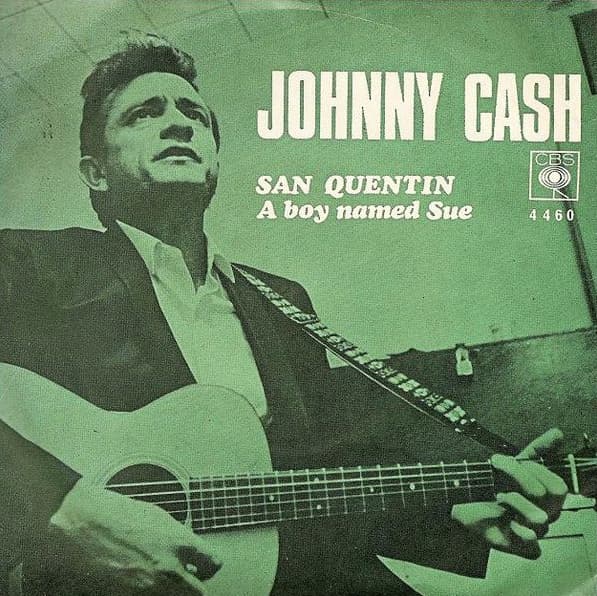
“A Boy Named Sue” – Johnny Cash’s Hilarious and Heartfelt Hit
When Johnny Cash performed the now-iconic song “A Boy Named Sue” at California’s San Quentin State Prison on February 24, 1969, he likely had no idea it would become one of the biggest hits of his career. Written by the multi-talented Shel Silverstein, this song wasn’t just a typical country tune; it was a perfect blend of humor, anger, and an unexpected twist of reconciliation. The live version of this track rocketed up the charts, becoming Cash’s biggest success on the Billboard Hot 100, spending three weeks at No. 2 in 1969, just shy of the top spot, which was held by The Rolling Stones’ “Honky Tonk Women.” The song also dominated the Billboard Hot Country Songs and Easy Listening charts, further cementing its legacy as one of Cash’s most beloved tracks. It was even certified Gold by the RIAA just months after its release, on August 14, 1969.
The song’s premise is both simple and unique. “A Boy Named Sue” tells the tale of a young man, abandoned by his father at the tender age of three, who is left with nothing but a name that becomes a lifelong source of humiliation. The name “Sue,” traditionally associated with females, leads to a childhood and early adulthood filled with bullying, resentment, and frustration. As a result, the boy becomes a hardened man, filled with bitterness and a vow to find his father and take revenge.
Eventually, Sue tracks down his father in a tavern in Gatlinburg, Tennessee, and after a tense and humorous showdown, the two engage in a vicious brawl. It’s only after this violent confrontation that Sue’s father reveals his reason for giving his son such an unusual name: He knew he wouldn’t be around to raise him, and he wanted his son to be tough enough to survive the world on his own. It was, in a twisted way, an act of tough love. This revelation catches Sue off guard, and rather than continuing his cycle of anger, he comes to a kind of peace with his father.
What makes “A Boy Named Sue” so memorable is its mixture of humor and deeper emotional undertones. The song is undeniably funny, especially with lines like “My name is Sue! How do you do? Now you’re gonna die!” But beneath the surface, it’s also about the complexities of fatherhood, forgiveness, and self-acceptance. Sue’s journey from bitter revenge to reluctant understanding gives the song its emotional weight.
Johnny Cash’s gravelly voice and deadpan delivery were the perfect match for this story. It allowed him to fully capture the absurdity and poignancy of Shel Silverstein’s lyrics. It was a brilliant choice to record the song live at San Quentin, as the raw energy of the prison audience amplified the song’s punch, making it feel even more authentic.
The song’s massive success wasn’t just a fluke. It resonated with audiences because it was relatable in its themes of family, hardship, and the quest for identity. Even today, “A Boy Named Sue” remains a favorite in Cash’s catalog, proving that humor and heart can go hand in hand in creating timeless music.